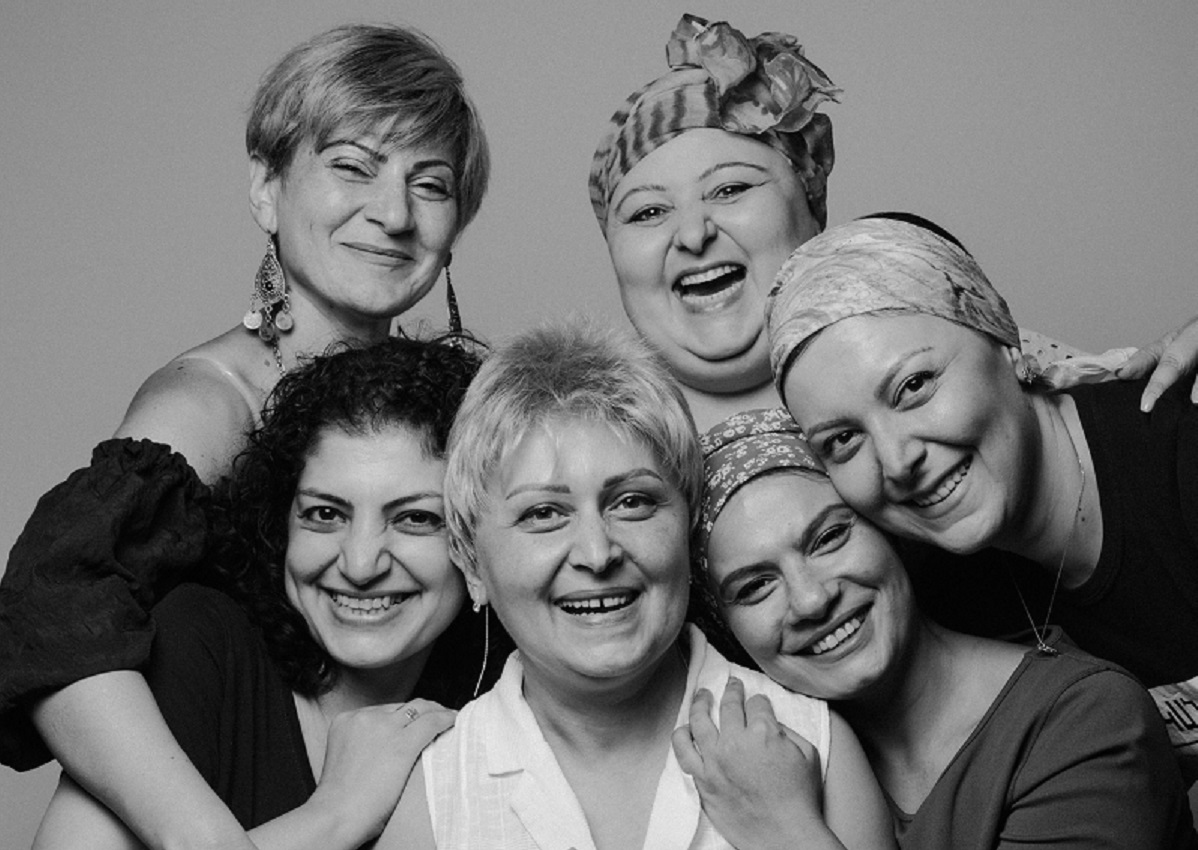Conspiracy theories: In Armenia, people don't trust the cancer-preventing vaccine
Cancer-preventing vaccine in Armenia
Every year in Armenia, cervical cancer is diagnosed in almost 200 women, 115 of whom die. This is the 8th most common cancer among women in Armenia and the 2nd among those aged 15–44.
The most common cause of this disease is the human papillomavirus (HPV), against which vaccination is provided for free in Armenia.
Why do the rates of illness and death not decrease, and what explains the refusal to vaccinate? Personal stories and expert opinions.
- Sale of medicines via electronic prescriptions: combating self-medication in Armenia
- Emergency medical service in Yerevan: stories and video
- Moped ambulances in Yerevan: delving into benefits and drawbacks
“If there is a chance to prevent cancer, it should be used”
Zhanna is 40 years old and has two daughters. When her elder daughter, Arevik, turned 14, Zhanna received a call from the clinic offering to vaccinate her. At the same time, they warned that the family could refuse the vaccination.
The vaccination was for the “Gardasil” vaccine against the human papillomavirus infection.
“Of course, I had heard about the vaccine. However, until it concerned my daughters, I did not delve into the details. After the doctor’s call, I asked for time to research the issue and make a final decision. I read several scientific articles and discussions in various groups. Of course, there were many negative opinions. But for the most part, they lacked scientific arguments and were mostly about some fears. Most of the posts claimed that the vaccine causes infertility in teenage girls,” Zhanna explains.
She admits that when she read the negative comments, she also got scared. But she decided not to succumb to conspiracy theories.
“When I read scientific articles, I realized that the side effects of this vaccine are much less than what is written on social media. Moreover, they mostly occurred in vaccinated individuals who had other diseases, sometimes hidden. I understood that the benefits of the vaccine for my girls would outweigh the potential harm,” she says.
That same day, Zhanna talked to her daughters. She explained what the human papillomavirus infection is, how it can be transmitted to a woman, and what consequences it can have. She also explained how “Gardasil” could prevent the disease. The next day, Zhanna went to the clinic with her elder daughter:
“What I read was so credible that I decided to get vaccinated myself. Two vaccine injections are provided for 14-year-olds, and my daughter has already received her first dose. Three vaccinations are provided for women of my age. I have received all doses. I think it was the right decision for both me and my daughter. The incidence rates of cancer are becoming more alarming every day. And if there is an opportunity to prevent the disease, it should be used.”
“Cancer can be cured if treatment is started at an early stage of the disease”
Armen Muradyan, rector of Yerevan State medical university, says that cervical cancer is the seventh most common cause of cancer death among women living in Armenia:
“The incidence rate of cervical cancer in Armenia is the second highest in the region, with 8.4 per 100,000 women. In Georgia, this figure is 9.8 per 100,000 women. Cervical cancer is the fourth most common type of cancer and the fourth leading cause of cancer death among women worldwide. In 2020, there were 604,127 new cases of cervical cancer and 341,831 deaths worldwide.”
Human papillomavirus (HPV) infection is currently the most common cause of cervical cancer. There is increasing evidence that HPV is a significant factor in the development of cancer in other parts of the body, such as the head and neck.
“There are no comprehensive data on the prevalence of human papillomavirus among residents of Armenia. However, data for Western Asia, the region where Armenia is located, are as follows: almost 2.5% of women from the total population are currently infected with this virus. And 72.4% of cases of cervical cancer are caused by it,” explains Muradyan.
In January 2015, Armenia launched its first cervical cancer screening program. Within a year, about 110,000 women aged 30 to 60 underwent a Pap smear test. Thanks to the implementation of screening and secondary prevention strategies, malignant neoplasms were detected in 15% of women who underwent the examination over the last three years.
“The incidence of cervical cancer has not changed significantly since the introduction of systematic screening in 2015. It can be cured if diagnosed and treated at an early stage of the disease. It is important for women to be aware of the symptoms and to consult a doctor if they have any complaints,” warns Armen Muradyan.
Why doesn’t the statistics change in Armenia
Sexopathologist Andronis Garibyan says there are two ways to prevent cervical cancer. The first is vaccination, and the second is periodic Pap testing, which allows for early detection of the disease and taking action:
“The distrust of the population towards the test in Armenia is due to mistrust in the quality of work of the clinics and indifference to their own health. However, it should be noted that in this case, the distrust of the clinics is unjustified, as problematic responses are further examined by professional laboratories.”
Garibyan also believes that this is one of the few programs about which the state has properly informed the population:
“Now, it is only necessary to take steps to increase trust in medical institutions and to limit or prohibit the preaching of unproven medicine. This is also a behavioral problem. Since medical services in clinics are free, people think they cannot be of high quality. On one hand, people tend to consider any free service as low quality; on the other hand, many simply cannot afford the same service in private hospitals or laboratories.“
“About ‘Gardasil’. Why are teenagers vaccinated?
‘Gardasil’ is a vaccine used in Armenia to combat human papillomavirus (HPV) infections. WHO research confirms that vaccines used against HPV are highly effective. Vaccination with even one dose creates a protective level of antibodies in 80-85% of cases.
The free HPV vaccination program started in Armenia in 2017. The plan was to vaccinate 13-year-old girls.
According to WHO research, vaccinations are more effective if administered during adolescence (from 9 to 14 years old), ‘before the start of sexual activity and encounter with the papillomavirus.’
Two doses of the vaccine are mandatory for 14-year-olds, with an interval of at least 6 months between doses. For those aged 15 and older, three doses of the vaccine are prescribed.
According to the Armenian Ministry of Health, over the last five years, 92,409 doses of ‘Gardasil’ vaccine have been used. Only 15,865 of the vaccinated were aged 13-14 years. Only 5,606 of those vaccinated received the second dose. Over the same five years, 1,221 initial cases of cervical cancer were identified, with 331 fatal outcomes recorded.
‘The time between HPV infection and the development of invasive cancer usually spans 20 years or more. Therefore, currently collecting vaccination status statistics against HPV among individuals with cervical cancer does not have statistical significance,’ state the medical experts.”
Sharing responsibility: men get vaccinated too
29-year-old Ashot Khachatryan is one of the few men who received all three doses of the ‘Gardasil’ vaccine. He says he learned about it from those who criticized it:
‘I came across this name in various posts on social media. I didn’t pay attention for a long time because the discussion seemed inadequate. But when it was impossible not to notice, I delved into the topic. I read both positive and critical articles about the test results. And I got the impression that the positive reviews were more substantiated.
I also learned that men can carry the virus, which can cause cancer and also be transmitted to women. So I found out that in Armenia, they started giving ‘Gardasil’ vaccinations for free, and I decided to get vaccinated. After getting the vaccine, I regularly posted on my Facebook page, encouraging others to get vaccinated.’
According to Ashot, many responded to his posts. Some tried to learn more details, others reported that after his posts they got vaccinated.
‘I’m sure there were many men who were initially surprised just like me. But, at least they learned that vaccination in their case is no less important. At the same time, if the results of my Facebook posts were encouraging, this cannot be said about the conversations in my environment.
When talking with friends, I consciously said that I was vaccinated. I wanted to hear their opinions and counterarguments on this topic, but in vain. Everyone just looked at me in surprise,’ he says.
He believes that the state does not give enough attention to this important social issue:
‘What is the state doing? In the style of Soviet propaganda, it sticks posters with bad design in clinics and occasionally posts on its Facebook page. And they probably consider this a successful campaign and write off large amounts of money. While campaigns related to health should be the most striking. And accurate and clear information on ‘controversial’ topics, such as Covid and ‘Gardasil’, should be more accessible than information about TV series dates.’
Ashot is convinced that educational activities should also be conducted among men, so they realize the seriousness and get vaccinated:
‘It’s about health and even a person’s life. And not only their own but also someone else’s. At least in such cases, one should read about the results of vaccinations, which were carried out for many years in developed countries. It’s worth verifying the information you read, check its authenticity, scientific sources. And having checked and convinced, you can go to the clinic and get vaccinated for free. By getting just three vaccines, you can protect yourself and your spouse, partner by 90-95% from the types of cancer caused by the human papillomavirus.’























